Try our favorite, clean protein powder: See our top pick →
Try our favorite, clean protein powder: See our top pick →
This post contains links through which we may earn a small commission should you make a purchase from a brand. This in no way affects our ability to objectively critique the products and brands we review.
Evidence Based Research To fulfill our commitment to bringing our audience accurate and insightful content, our expert writers and medical reviewers rely on carefully curated research.
Read Our Editorial Policy
Branched-chain amino acids, or BCAAs, are amino acid supplements commonly used by athletes and people aiming to boost exercise performance or muscle growth.
But as with many supplements, many people wonder if the benefits are overhyped.
As it turns out, there is evidence that BCAAs can benefit muscle mass and recovery—and some benefits that go beyond the gym, including improving liver function and possibly helping with fat loss.
Let’s take a deeper dive into what BCAAs are, the top six health benefits of BCAAs, and how to include them in your supplement routine.
BCAAs consist of three amino acids—leucine, isoleucine, and valine.
They are so-called because they are the only amino acids with a chain that branches off to one side.
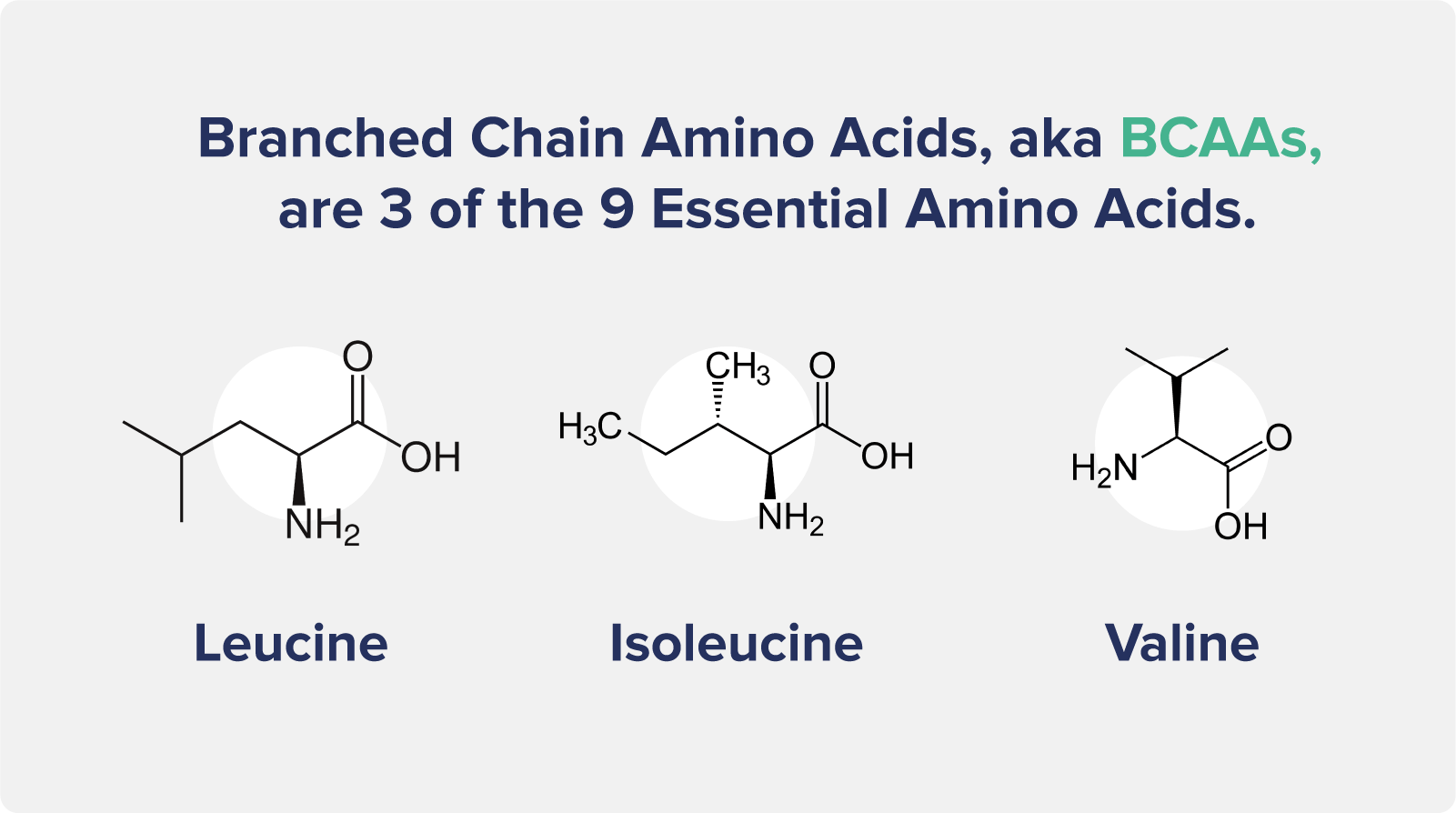
Leucine, isoleucine, and valine are also part of the essential amino acid family, a group of nine amino acids the human body cannot make—therefore, they are essential to get from diet.
Similar to all amino acids, BCAAs are the building blocks of protein.
But in contrast to other amino acids, BCAAs are mostly broken down in the muscle—as opposed to the liver—and play a key role in energy production during exercise, which is why they are used so often in muscle-building supplements.

The most well-known claim to BCAAs’ fame is that they can boost muscle mass or synthesis.
In research with older males in their 70s, those who supplemented with 6g of BCAAs had significant increases in early myofibrillar protein synthesis rates—the major component of the skeletal muscle—two hours after consumption.
However, it’s worth noting that the men who consumed milk (providing a similar amount of BCAAs) also experienced muscle-synthesizing effects—and for a more extended period after ingestion.
Another study published in the journal Frontiers in Physiology reported that young men who consumed a supplement containing 5.6g of BCAAs after resistance training had a 22 percent increase in muscle protein synthesis compared to a control group.
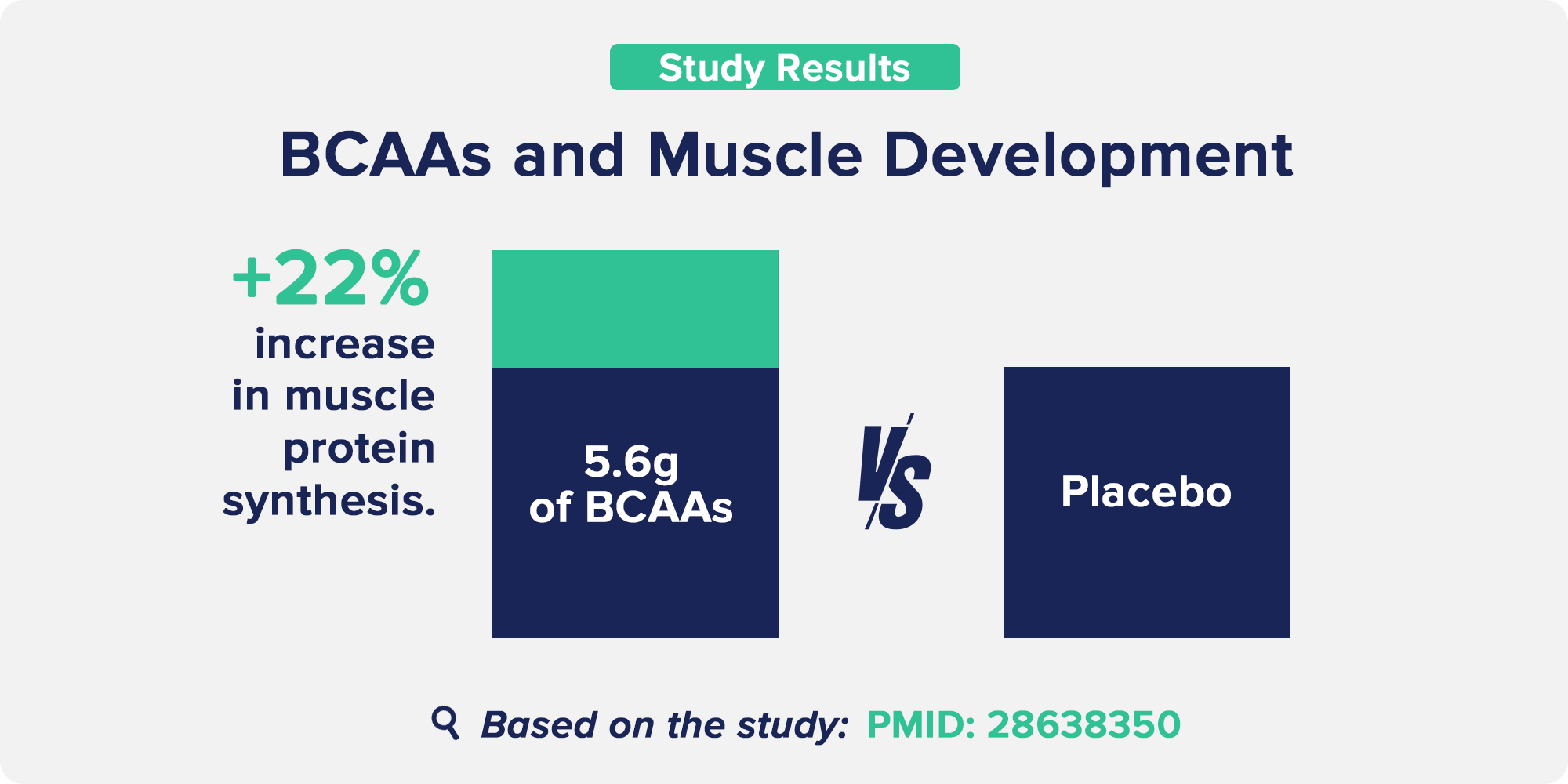
Of the three BCAAs, leucine is thought to have the most impact on muscle growth.
Leucine is not only a precursor for muscle protein synthesis but also plays a vital role in the intracellular signaling pathways involved with protein synthesis.
However, while studies show that BCAA consumption can increase markers of muscle growth in the short term, evidence of BCAAs boosting muscle mass in the long term is lacking.
Consuming BCAAs before exercise or an athletic event may improve performance by reducing fatigue during activity.
One study found that people who drank 20g of BCAAs before working out were able to spend an average of 50 minutes on the treadmill before becoming fatigued compared to 46 minutes in people who took a placebo.
In more long-term research, sedentary men who took 4g per day of leucine had a 41% gain in the maximum repetitions they could complete during a 12-week resistance training program, compared to a 31% increase in people supplementing with lactose.
Lastly, a small, three-day study found that people who supplemented with BCAAs had a 17% greater resistance to fatigue compared to when they took a placebo.
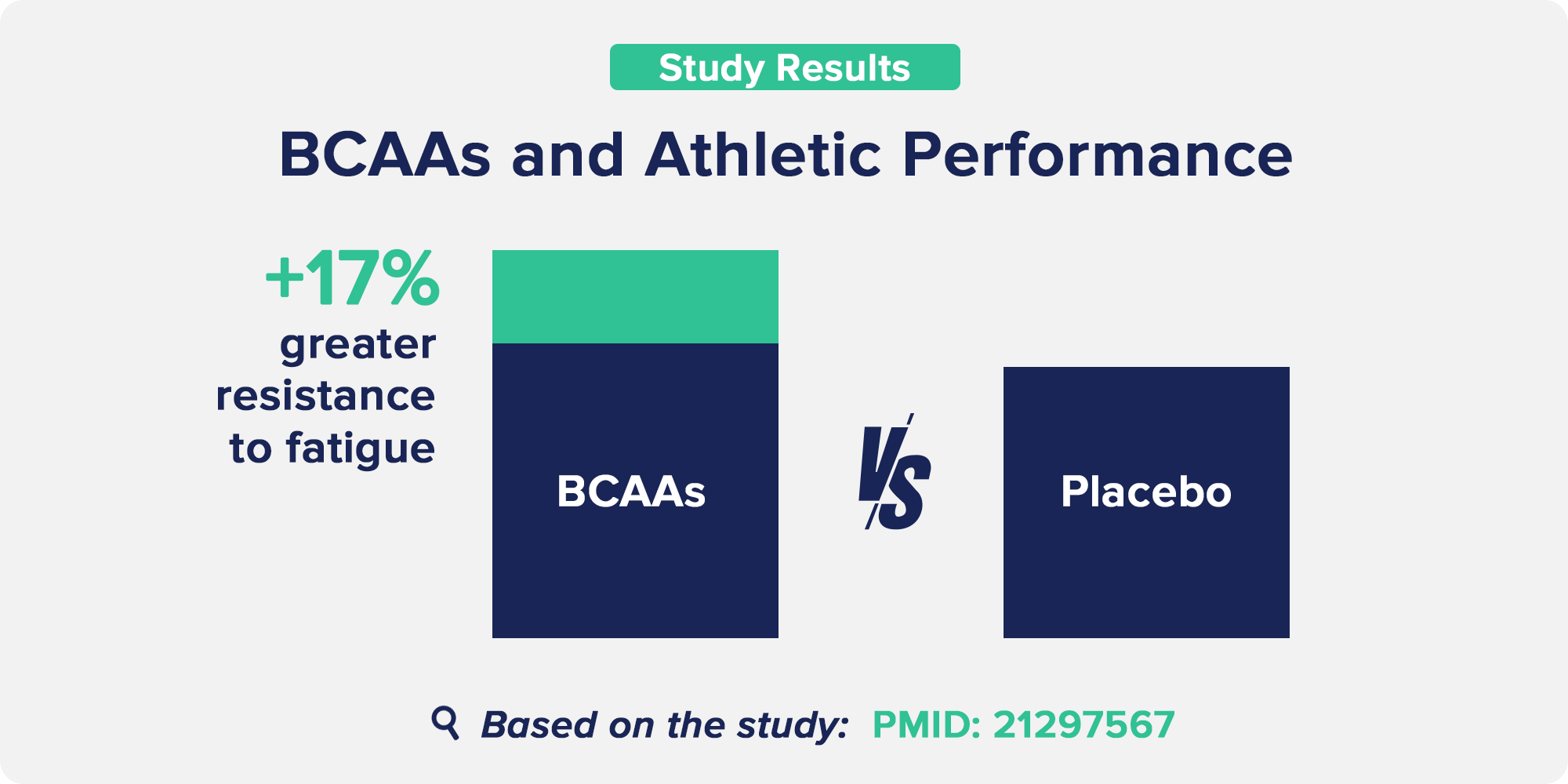
Supplementing with BCAAs may reduce the muscle damage and soreness that tends to occur after strenuous exercise.
It’s thought that BCAAs improve recovery because they reduce levels of creatine kinase and lactate dehydrogenase, two enzymes involved in muscle damage.
Notably, a 2019 meta-analysis of eight studies reported that BCAA supplementation reduced DOMS—delayed-onset muscle soreness—after training by approximately 27%.
Plus, a randomized controlled trial with healthy men found that those who supplemented with BCAAs before completing 100 consecutive drop-jumps (yikes) had reductions in markers of muscle damage and muscle soreness with accelerated recovery compared to the placebo group.
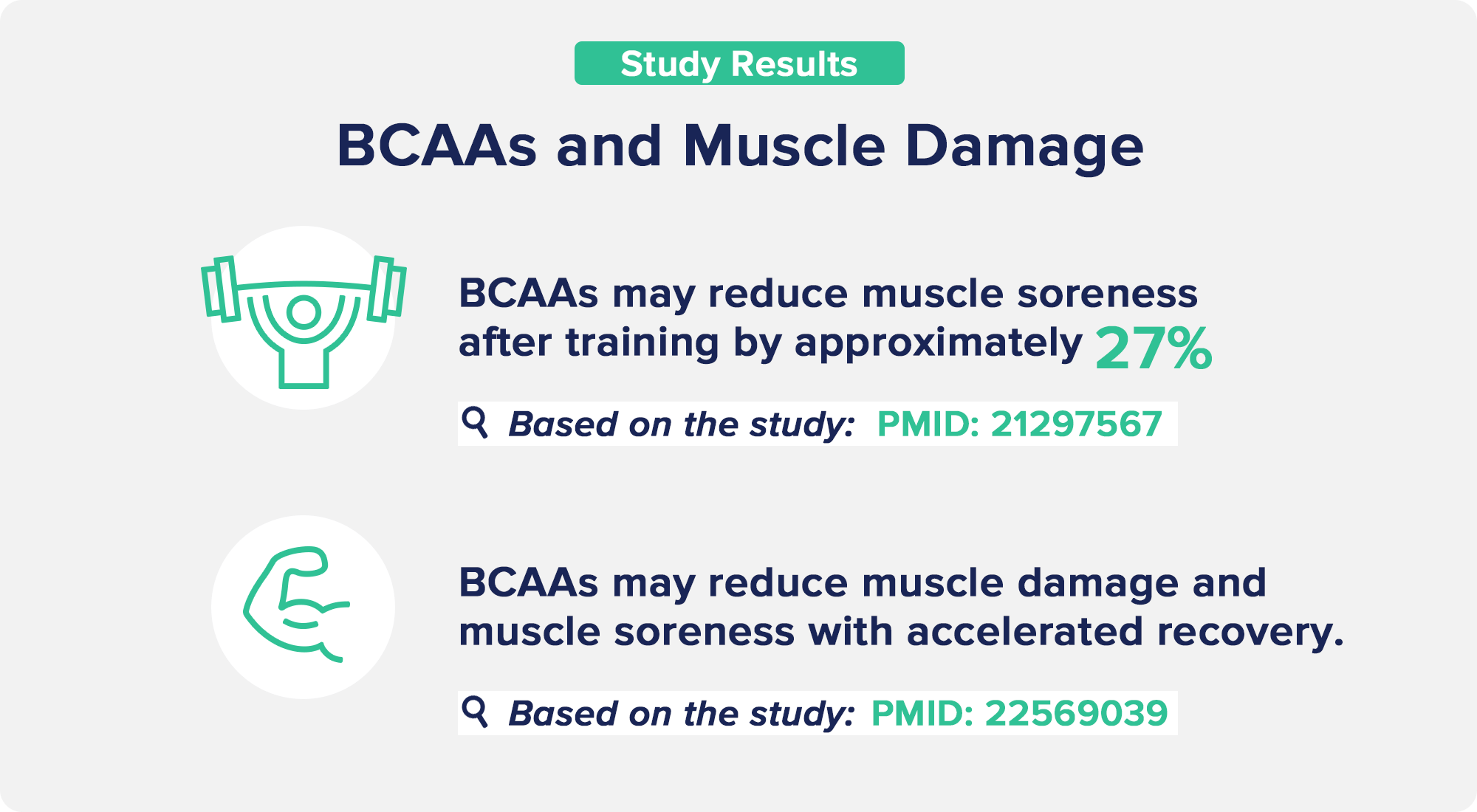
Although most of the research on BCAAs is done with young, healthy men, the potential benefits are not just for the bodybuilding crowd—they may also help prevent sarcopenia in older adults.
Also known as muscle atrophy, sarcopenia significantly contributes to frailty, fractures, falls, loss of independence, and mortality in older adults.
In a 2020 study published in Aging, older adults with pre-sarcopenia or sarcopenia were randomized to take either 7.2g of BCAAs or a placebo for five weeks.
The BCAA-takers experienced significant improvements in skeletal mass index, gait speed, and grip strength compared to the placebo group, suggesting positive effects on sarcopenia.
However, the benefits were not sustained 12 weeks later, indicating that older adults would need to continually supplement with BCAAs to maintain the muscle-related effects.
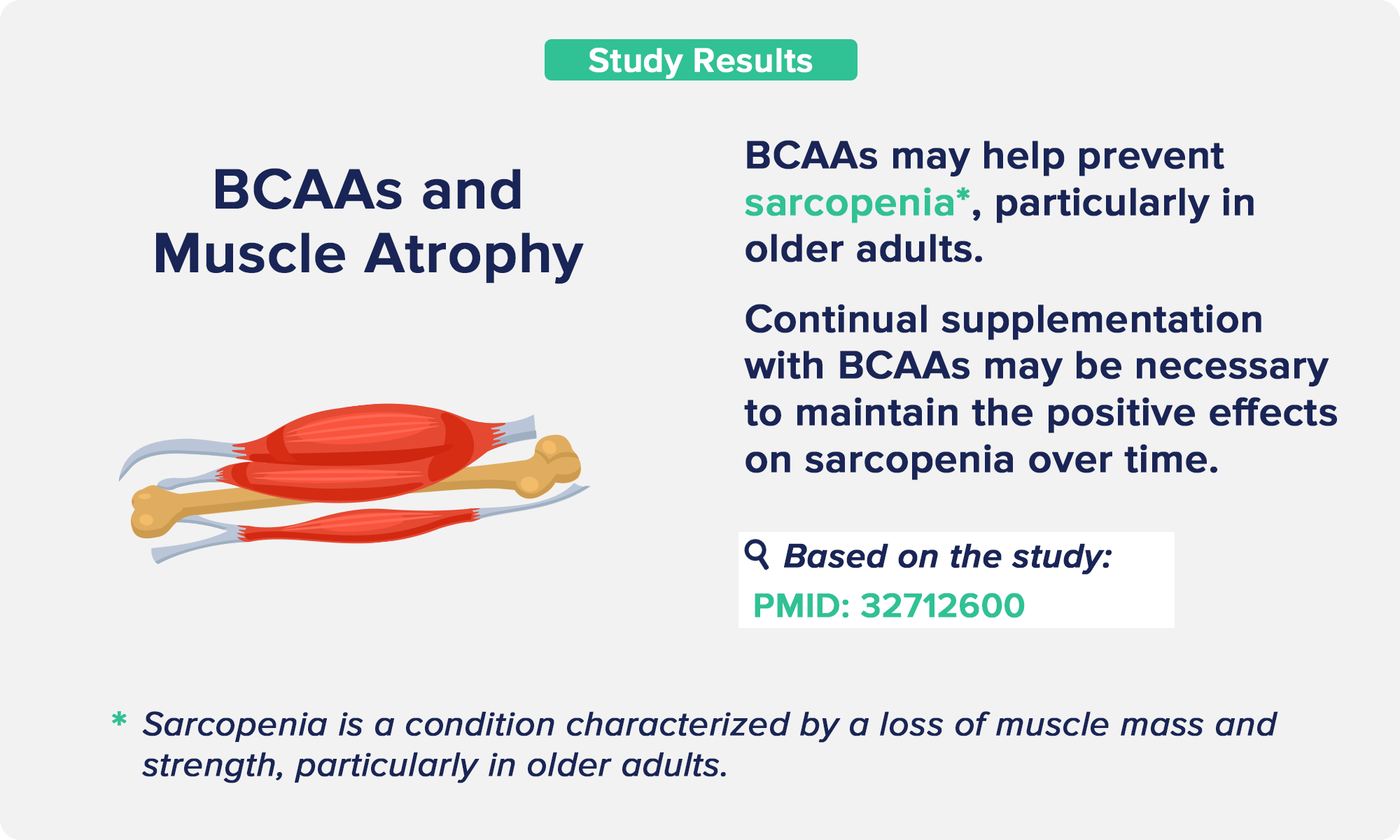
Supplementing with BCAAs may improve liver function in some conditions, including cirrhosis and liver cancer.
In a study of 104 people with cirrhosis, those who supplemented with BCAAs had a better prognosis, likely due to improving their protein status and reducing malnutrition.
Similarly, a meta-analysis of 11 trials found that BCAA supplementation improved prognosis and liver function in people undergoing hepatic surgeries, including shorter hospital stay duration and reduced risk of complications.
Blood levels of BCAAs are typically decreased in patients with liver cirrhosis or other liver diseases; therefore, replenishing them supplementally may help with symptoms or delay progression.
Plus, BCAAs are thought to play a role in the regeneration of hepatocytes (liver cells), supporting overall liver health.
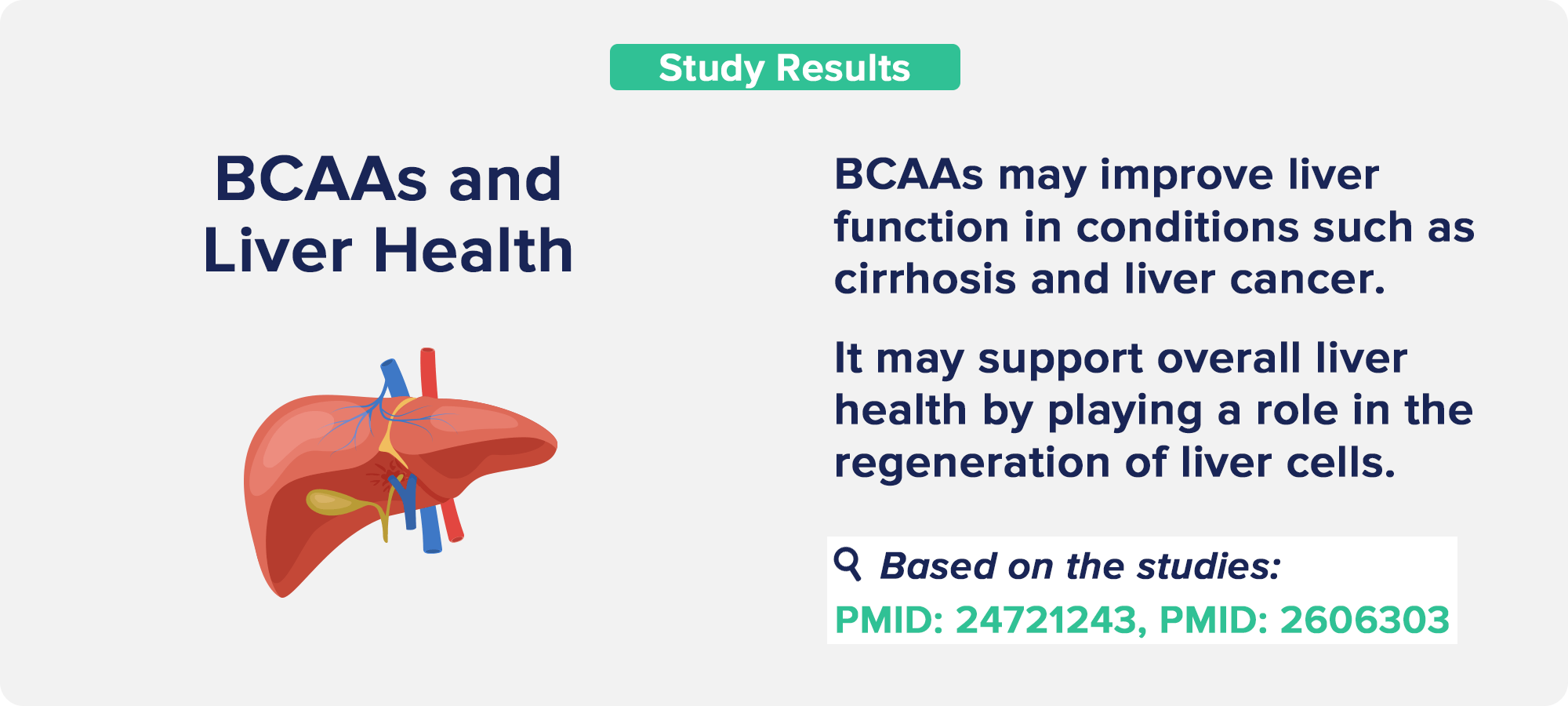
Lastly, taking BCAAs may help to improve body composition by reducing body fat.
It’s thought that BCAAs help increase body fat oxidation—plus, greater amounts of muscle mass will burn more calories, supporting weight loss.
One study found that males who took BCAAs for eight weeks reduced their body fat percentage by 2% (compared to 1% in people drinking whey protein or sports drinks).
However, research on this topic has been mixed—especially in studies with women.
In a randomized controlled trial with 42 overweight or obese women, those who took BCAAs did not have significant differences in weight loss compared to the placebo group—although they did show improvements in waist-to-hip ratio and leg leanness.
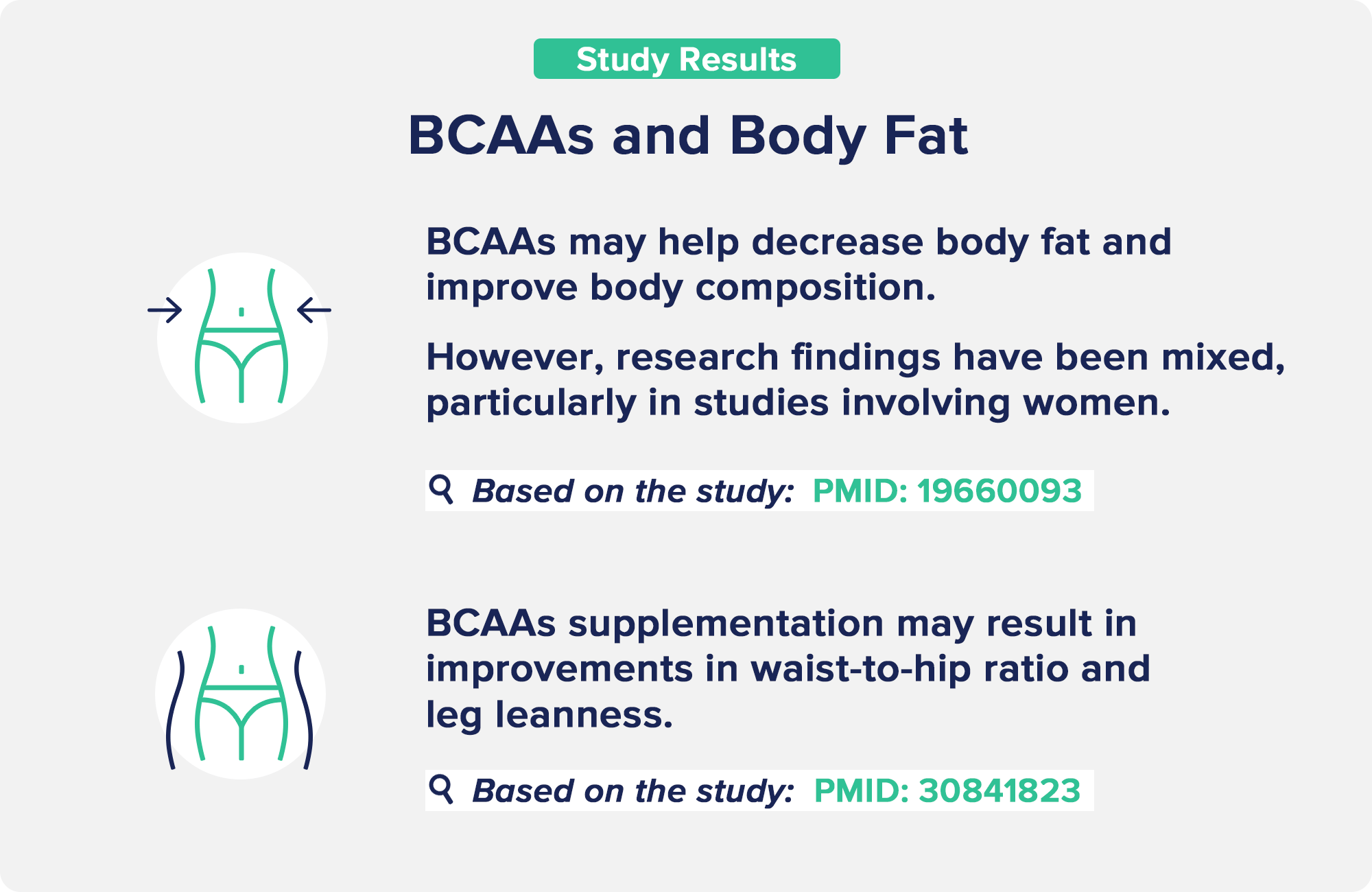
Although BCAAs are found in food—the best sources are poultry, eggs, milk, whey, and soy—many people prefer the ease and convenience of supplementing with them instead.
BCAAs are available in powder, capsules, and pills, but the most common way to consume them is typically in a powder mixed with water or another drink before a workout.
Although we’ve seen in the research that taking BCAAs just once can benefit your workout, you may see the best results when regularly supplementing with BCAAs over a longer period—even on days you are not exercising.
The dosage of BCAAs varies depending on weight, exercise level, and sex, but it’s often recommended to take 200 mg per kg of body weight, which translates to 91 mg per pound of body weight.
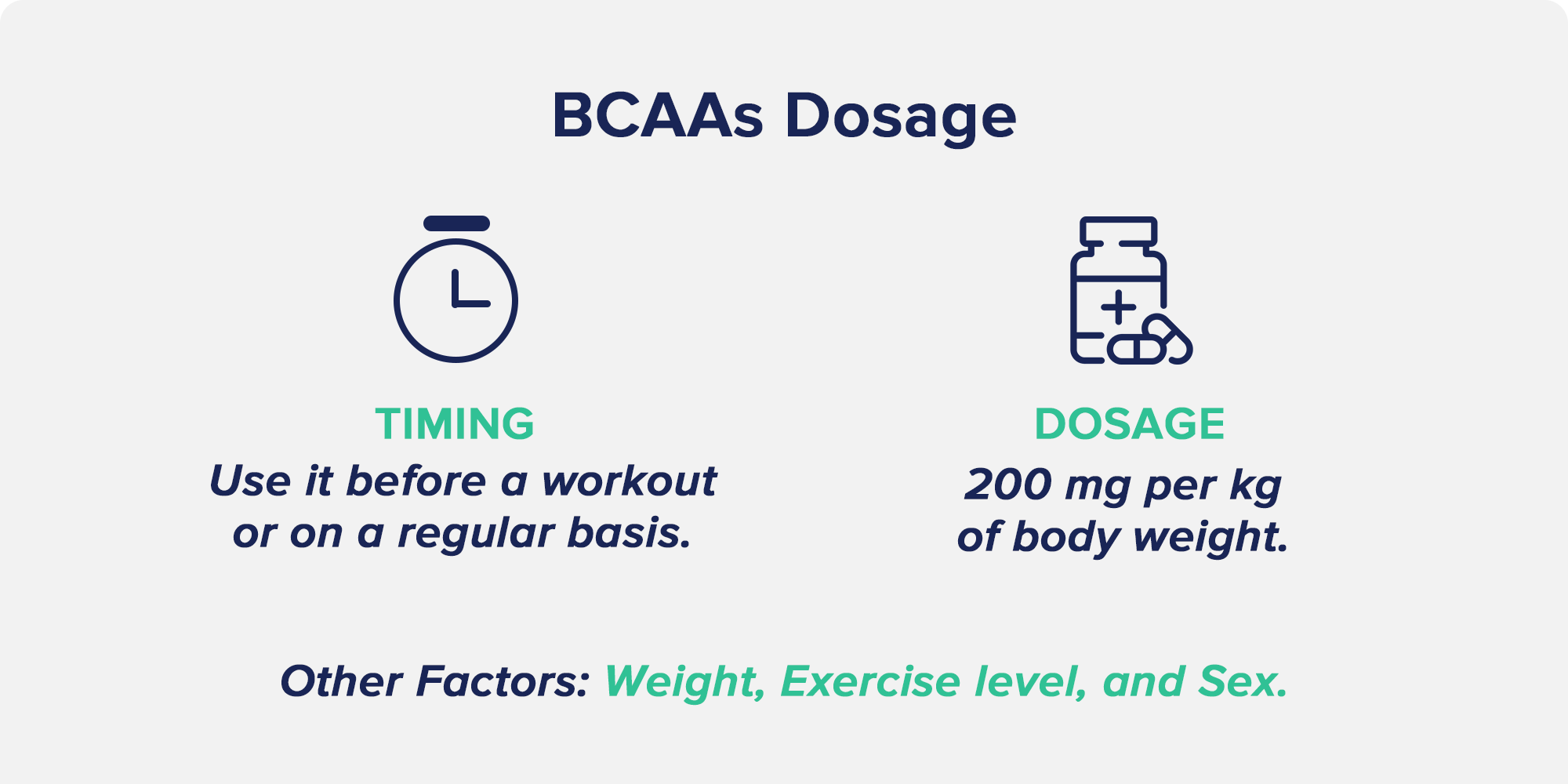
For example, someone weighing 165 lbs would ideally take 15g of BCAAs per day, which can be split up into smaller doses.
One example of a BCAA supplement we like is NOW Sports BCAA Blast, which also contains caffeine from green coffee beans and sodium to replenish lost electrolytes.
Another option is Zhou Nutrition Muscle BCAA, which provides all three BCAAs in addition to vitamin C, probiotics, tart cherry for antioxidant support, and coconut water powder to rehydrate.
Yes, it is fine to take BCAAs every day.
BCAAs are generally considered a safe supplement when used in doses of less than 35g per day.
BCAA blood levels tend to peak 30 minutes after consuming them.
However, supplementing with BCAAs one to two hours before—or even after—exercise has also still exhibited benefits.
BCAAs may help to reduce belly fat, although the research is mixed.
Some studies have found that BCAAs reduce body fat in men but not women.
BCAAs are generally considered a safe supplement when used in doses less than 35g per day.
When consumed in high doses, BCAAs may cause fatigue, loss of coordination, nausea, headaches, or insulin resistance.
Both creatine and BCAAs can be beneficial for exercise performance and muscle health.
However, creatine tends to be better for increasing muscle size and strength, while the research on BCAAs leans more toward muscle repair and recovery post-exercise.
AbuMoh’d MF, Matalqah L, Al-Abdulla Z. Effects of Oral Branched-Chain Amino Acids (BCAAs) Intake on Muscular and Central Fatigue During an Incremental Exercise. J Hum Kinet. 2020;72:69-78. Published 2020 Mar 31. doi:10.2478/hukin-2019-0099
Fedewa MV, Spencer SO, Williams TD, Becker ZE, Fuqua CA. Effect of branched-Chain Amino Acid Supplementation on Muscle Soreness following Exercise: A Meta-Analysis. Int J Vitam Nutr Res. 2019;89(5-6):348-356. doi:10.1024/0300-9831/a000543
Fuchs CJ, Hermans WJH, Holwerda AM, et al. Branched-chain amino acid and branched-chain ketoacid ingestion increases muscle protein synthesis rates in vivo in older adults: a double-blind, randomized trial. Am J Clin Nutr. 2019;110(4):862-872. doi:10.1093/ajcn/nqz120
Gualano AB, Bozza T, Lopes De Campos P, et al. Branched-chain amino acids supplementation enhances exercise capacity and lipid oxidation during endurance exercise after muscle glycogen depletion. J Sports Med Phys Fitness. 2011;51(1):82-88.
Howatson G, Hoad M, Goodall S, Tallent J, Bell PG, French DN. Exercise-induced muscle damage is reduced in resistance-trained males by branched chain amino acids: a randomized, double-blind, placebo controlled study. J Int Soc Sports Nutr. 2012;9:20. Published 2012 Jul 12. doi:10.1186/1550-2783-9-20
Ispoglou T, King RF, Polman RC, Zanker C. Daily L-leucine supplementation in novice trainees during a 12-week weight training program. Int J Sports Physiol Perform. 2011;6(1):38-50. doi:10.1123/ijspp.6.1.38
Jackman SR, Witard OC, Philp A, Wallis GA, Baar K, Tipton KD. Branched-Chain Amino Acid Ingestion Stimulates Muscle Myofibrillar Protein Synthesis following Resistance Exercise in Humans. Front Physiol. 2017;8:390. Published 2017 Jun 7. doi:10.3389/fphys.2017.00390
Ko CH, Wu SJ, Wang ST, et al. Effects of enriched branched-chain amino acid supplementation on sarcopenia. Aging (Albany NY). 2020;12(14):15091-15103. doi:10.18632/aging.103576
Novin ZS, Ghavamzadeh S, Mehdizadeh A. The Weight Loss Effects of Branched Chain Amino Acids and Vitamin B6: A Randomized Controlled Trial on Obese and Overweight Women. Int J Vitam Nutr Res. 2018;88(1-2):80-89. doi:10.1024/0300-9831/a000511
Shu X, Kang K, Zhong J, et al. [Meta-analysis of branched-chain amino acid-enriched nutrition to improve hepatic function in patients undergoing hepatic operation]. Zhonghua Gan Zang Bing Za Zhi. 2014;22(1):43-47. doi:10.3760/CMA.j.issn.1007-3418.2014.01.010
Stoppani J, Scheett T, Pena J, Rudolph C, Charlebois D. 2009 International Society Of Sports Nutrition Conference And Expo New Orleans, La, USA. 14-15 June 2009. Abstracts. J Int Soc Sports Nutr. 2009;6 Suppl 1(Suppl 1):P1-P19. Published 2009 Jul 31. doi:10.1186/1550-2783-6-s1-p1
Yoshida T, Muto Y, Moriwaki H, Yamato M. Effect of long-term oral supplementation with branched-chain amino acid granules on the prognosis of liver cirrhosis. Gastroenterol Jpn. 1989;24(6):692-698. doi:10.1007/BF02774169
Subscribe now and never miss anything about the topics important to you and your health.